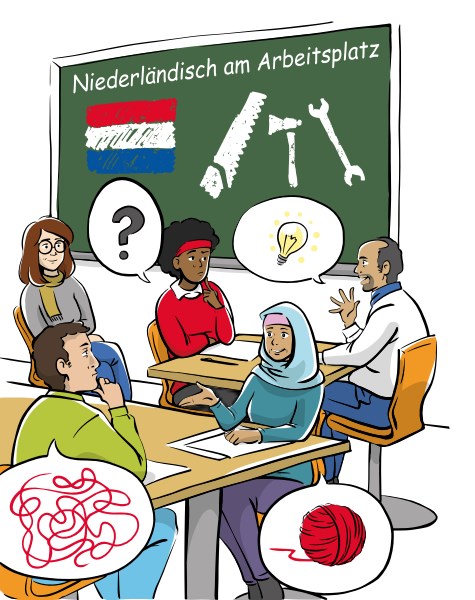
Download IQ Good Practice International as PDF
including interview with Annemarie Nuwenhoud, developer of My Plan Allie Levinsky, VP of Product & Partnerships at Upwardly Global
Netherlands: The My Plan approach
Peer coaching can help newcomers improve work-related language skills, by fostering their awareness and autonomy as learners.
Starting position/challenge
In recent years, with Germany and other countries admitting larger numbers of newcomers, a lot of experimentation has gone into making integration support more flexible, individualised, and sustainable. Against this backdrop, the limitations of traditional approaches to language training have become evident. Classroom teaching alone can hardly do justice to the increasing heterogeneity of newcomers’ profiles, needs and aspirations. Moreover, language courses may at times stand in conflict with workrelated goals, as employers find it difficult to release staff for classroom learning.
Classic language courses are a crucial pillar of integration support. But they may benefit from being flanked with more individualised approaches – especially ones that can convey to the learner a sense of ownership and responsibility. The activities of daily life, and of work in particular, present myriad informal chances for newcomers to learn the host country language. But not everyone is immediately able to identify and seize these opportunities: people with low levels of formal education, for example, often lack the awareness and tools to take control of their own learning.
Non-directive coaching and “My Plan”
In 2016, Annemarie Nuwenhoud, a programme developer, teacher trainer and teacher in the Netherlands, was hired by a Dutch private language training company to deliver a language course to a group of migrants, who at the time worked as cleaners in the Amsterdam area. Participants had a very basic level of Dutch, and the course, which focussed on language for work-related use, had a relatively short duration of 60 hours over four months. Concerned that this would be too little time for language learners to reach their goals, Annemarie decided to add coaching to the recipe. This is how “My Plan” took off.
My Plan is based on non-directive coaching. Unlike classic teaching or directive coaching, where the teacher/coach structures and controls the learning process, a non-directive coach is mainly a facilitator who helps the learners reformulate their objectives into concrete practical problems to solve, so they are able to draw up a suitable action plan. The centrepiece of non-directive coaching is a conversation structured around a set of questions about the learners’ starting position, their desired goals, and the best options to achieve them. Through these conversations, the learners reflect on their strategies and progress, thus gaining awareness and autonomy.
In developing My Plan, Annemarie Nuwenhoud made some important choices to adapt classic non-directive coaching to the needs of low-level language learners – for example, making it less abstract and more pragmatic. This resulted in three sets of questions: on a weekly basis, the coach and the participants would discuss questions about learning goals for the upcoming week and about the progress achieved so far; additionally, once every few months, questions about long-term plans would guide the conversation. For example, a Nigerian immigrant who was working as a cleaner decided he wanted to become a bus driver; he then recognised that, to get there, the first step was to improve his Dutch language skills in his then-job, and the second step was to study for a driver certificate.
Another key feature of My Plan is peer coaching. Initially, a coach supports the learners, but over time this hierarchy fades, as participants begin to coach each other. This transfer of coaching skills plays on a learning strategy that humans acquire very early in their life, and that cuts across education levels or cultural backgrounds: learning through observation. A key advantage of peer coaching when working with newcomers is that it allows participants to bring their own values, norms, orientations and approaches into the process, thus making coaching (a very Western methodology) more interculturally sensitive and accessible.
My Plan led to an increase of confidence and awareness and fostered a sense of solidarity among participants. Compared to groups that took part in language courses without any coaching element, the learners developed more realistic ideas of what it takes to learn the language and began to more actively seek out learning opportunities outside the classroom. The interactive character of peer coaching was also beneficial: for the learners, having real conversations about things that mattered to them proved to be a simple yet strikingly effective way to learn the target language.
Summary
For newcomers, learning the language needed for a profession in the host country is crucial for their participation in the labour market – but courses are often not enough. As a complementary element to classroom teaching, My Plan and similar coaching approaches can make learners more aware of when, where and with whom they can practise the language at work. By cultivating autonomy and learning-to-learn skills, non-directive coaching can make newcomers more resilient and adaptive. At the same time, peer coaching helps generate a sense of solidarity and creates a safe space in which learners from different cultural backgrounds can become more confident about their strengths, motivations, and goals.
Target groups:
language-for-work teachers, second/foreign language teachers, employers, project coordinators, integration policymakers
Summary:
My Plan uses a non-directive, peer coaching approach to help newcomers develop host-country language skills, especially in work-related language.
Creator of the model:
Annemarie Nuwenhoud, programme developer and teacher, member of the European Language for Work Network.
Further literature:
A. Nuwenhoud (2018). “The My Plan Approach”, languageforwork.ecml.at
A. Braddell (2017). Citizens’ Curriculum guide to Non-directive coaching. Leicester: L&W Learning and Work Institute
